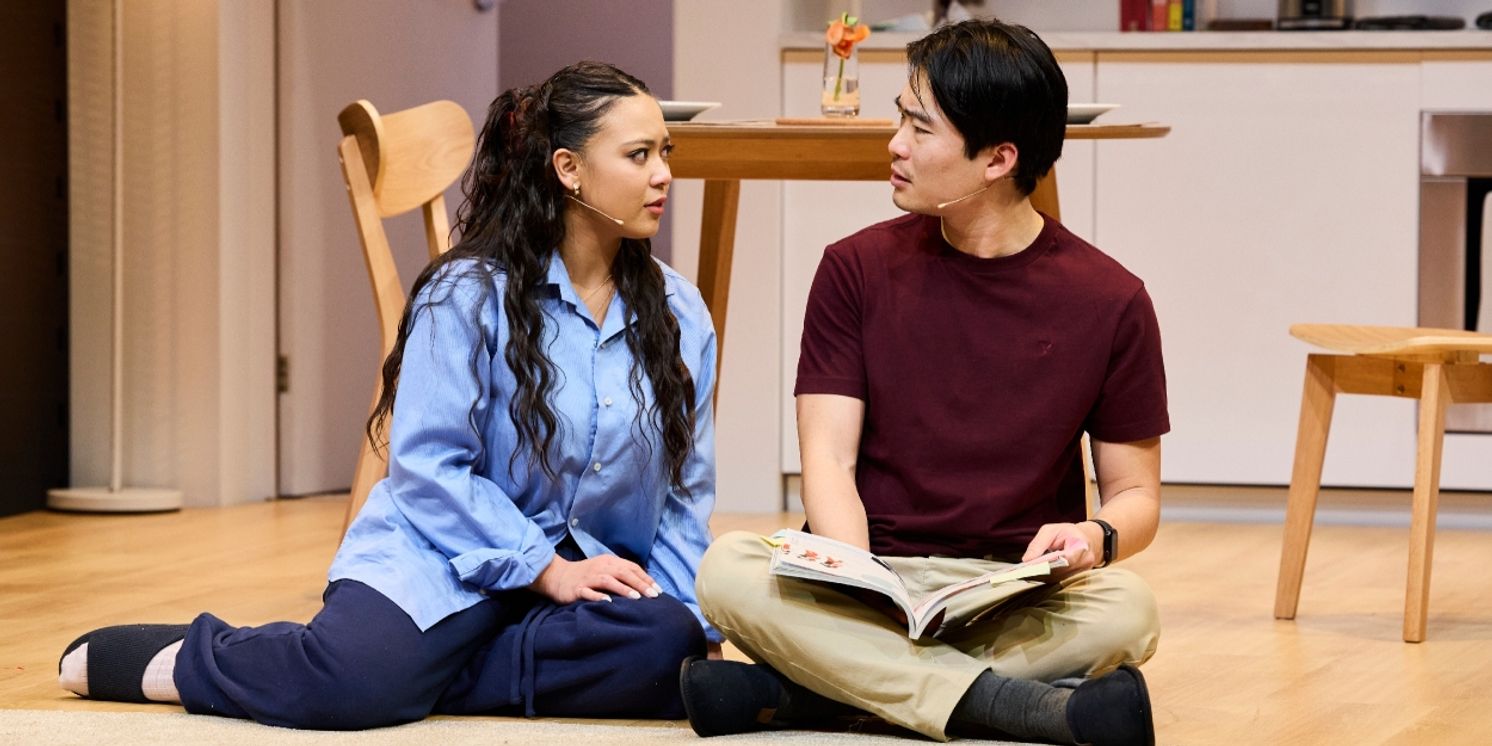Review: THE QUESTIONS at Space Theatre, Adelaide Festival Centre
The world premiere of a new musical.

Reviewed by Barry Lenny, Tuesday 30th July 2024.
The latest production from the State Theatre of South Australia is the world premiere of a light-hearted musical, The Questions, written by Van Badham, book and lyrics, and Richard Wise, music and lyrics. It is directed by the company’s Artistic Director, Mitchell Butel, with musical coordination by Kym Purling. Butel has, once again, recruited a superb cast and created a captivating production, bringing out all of the layers in Badham’s rich script. Purling has ensured that Wise’s music is integrated into the performance.
Inspired by the true story of a couple meeting for the first time and caught out by a COVID-19 lockdown in China, it is based in part on a research project carried out in 1997 by psychologist, Arthur Aron, and his team, which came to the attention of the general public through an article in the New York Times in 2015. He arrived at a set of 36 questions, divided into three groups of 12, each group becoming more intimate, revealing more of the person answering, revelations which could theoretically bring two people closer together.
The research, with the rather dry title, The Experimental Generation of Interpersonal Closeness: A Procedure and Some Preliminary Findings, appeared in the Personality and Social Psychology Bulletin, Vol. 23, No. 4, in April 1997, the publication of the Society for Personality and Social Psychology. This romantic comedy is not, however, as daunting as that research title.
An obviously incompatible couple, The Resident, played by Charles Wu, a graphic designer who says that he would enjoy sharing a meal with right-wing, misogynistic, men’s rights proponent, Jordan Peterson, and The Visitor, who holds a Masters Degree in Gender Studies, played by Chaya Ocampo, are about to have their first date, a meal at his flat. She arrives late. He makes a point of her tardiness being unacceptable. From that rocky start, things quickly go downhill. They realise that they simply cannot stand one another. She soon makes her excuses to bring about a quick end to the date and heads for the door, much to the relief of both of them, but she doesn’t make it in time.
They are caught out by a sudden lockdown, with the government calling on everybody to immediately ’shelter in place’, preventing her from leaving to go home. Things between them rapidly deteriorate further, and there is no indication as to how long they might be forced to cohabit, nor what it is that has brought about the lockdown, although we discover later that helicopters and drones are involved. Services are interrupted, adding to the greater isolation beyond being locked in a flat. The television stations shut down, the Internet fails, and mobile phones don’t work. The lack of outside communication leaves them wondering what is happening, how long it will last, and even, perhaps, if this is going to be the end of their lives.
The flat has only one bedroom so she makes up a bed on the floor to one side of the main room, a combined kitchen/dinette, and lounge. It soon becomes apparent that it is going to be a long lockdown and that, in spite of their major differences, they need to find some way to get along in this claustrophobic environment.
She has a magazine in her bag, annotated with numerous sticky notes. She has been reading and commenting on the 36 Questions that (might) lead to love. To kill time, and distract themselves from their ongoing angry exchanges, they decide to answer those 36 questions. As they work their way through them, they begin to discover much about each other, and about themselves.
Badham’s script has two clear levels, the interpersonal dialogue between the two characters, and the bigger picture of isolation, lack of community, making connections, relationships, and finding love in the 21st Century. It is filled with light and shade and offers plenty of laughter, and a few sharp intakes of breath.
From the facing windows of another flat, they can watch, hear, and be observed by a trio of musicians: Sam Lau (keyboard and vocals), James Bannah Jr. (keyboard), and Jackson Mack (electronic drums), who act as a Greek chorus, of sorts. Some of the music is recorded, but the major part is played live by these three. Along with lighting variations, they signal scene changes. As well as musically, and physically commenting on the action, they sometimes interact with the couple in mime. At several moments, when discretion is required, they briefly leave the room or close the blinds to give the couple some privacy.
Jeremy Allen’s clever set design combines the smart flat owned by The Resident, the music room of the neighbours, and the tall buildings of the city skyscape beyond. The lighting design by Gavin Norris brings it all to life. Very important, of course, is Andrew Howard’s sound design.
At the core of the production, there are Charles Wu and Chaya Ocampo, as The Resident and The Visitor, creating a great pair of totally opposite characters and building a strong rapport as they negotiate a range of emotional conflicts and some hilarious verbal interchanges.
This is another winner for State Theatre, and their Artistic Director, Mitchell Butel. Be sure to get tickets.
Photography, Claudio Raschella.
Reader Reviews
Videos

